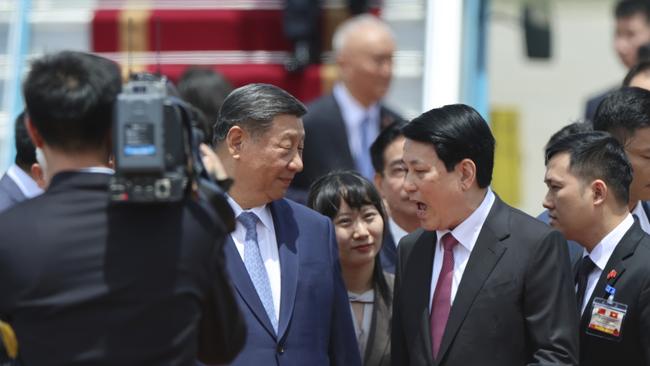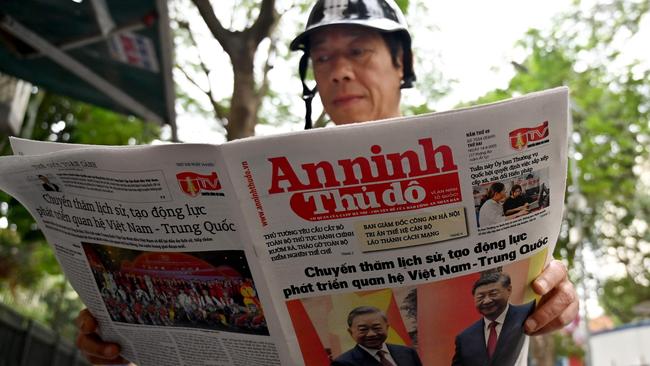Southeast Asia should check the fine print in Xi Jinping’s charm offensive
The Chinese leader’s ‘tea and sympathy’ tour will be welcome in Southeast Asia’s tariff-clobbered capitals, though it could be lighter on sweeteners than risk

Trade wars yield “no winners”, Chinese President Xi Jinping declared on Monday, as he set out on a five-day tour of neighbouring Southeast Asia to peddle sweeteners and solidarity to countries squarely in the firing line of US tariff punishment.
Yet victory in the long struggle with the US for regional dominance is exactly what Xi hopes to achieve with his rare tour this week of Vietnam, Malaysia and Cambodia – among the region’s hardest-hit from Washington’s reciprocal tariff policies now on pause as the White House tries to calm the bond markets.
Xi’s message of support will of course be welcomed as each Southeast Asian nation seeks to minimise the impact of President Donald Trump’s erratic trade policy.
But whether the Chinese leader can offer much more than commiserations – given his country’s own sluggish economy and trade hit from Washington – remains to be seen.
“China doesn’t have the vast fortunes to invest in Belt and Road Initiative projects like they used to, and a lot of Chinese tourism has been scared off in Southeast Asia”, mostly by Chinese-run online scam factories, says Michael di Gregorio, a Vietnam expert and the Hanoi-based former country head for the Asia Foundation.
“I’m not sure what he can offer besides assurances, and that is primarily what he is there for.”
An article published under Xi’s name in Vietnam’s Namh Dan newspaper ahead of his arrival in Hanoi on Monday said China stood ready to invest more in Vietnam’s rail network, to buy more Vietnamese products, and to encourage more private Chinese investment and trade with Vietnam.

“Trade war and tariff war will produce no winner, and protectionism will lead nowhere. Our two countries should resolutely safeguard the multilateral trading system, stable global industrial and supply chains,” it said.
In a written exchange on Sunday with Indonesian President Prabowo Subianto, Xi declared the two nations had “stood together through thick and thin” over the years, while earlier this month he told Indian Prime Minister Narendra Modi their countries should work more closely in a “dragon-elephant tango”.
The region may never have seen a more concerted charm offensive from China’s leader, better known for his strongman tactics in the South China Sea than velvet-gloved diplomacy.
Yet the fact is China’s interests are far from perfectly aligned with those of Southeast Asia.
Few doubt Beijing will be eyeing off ASEAN markets as a potential dumping site for the cheap Chinese export products no longer welcome in the US – a move that could deepen the pain for regional economies.
Xi will be working hard to ease those fears in Hanoi, Kuala Lumpur and Cambodia, but equally there is little room in China’s squeezed domestic market to increase imported goods from its neighbours.
His claim to the mantle of trade rules protector also comes off a bit rich given Beijing’s habit of doling out trade punishment to wayward partners.
That Vietnam is first cab off the rank for Xi this week is no coincidence given its heavy export dependence on the US market, and its importance to China’s global supply chain.
Chinese manufacturers as well as China-based manufacturing giants such as Samsung and Apple have looked to Vietnam in recent years to circumvent US trade sanctions, powering its manufacturing economy and driving up its trade surplus with the US.
While that has left Hanoi vulnerable to the Trump administration’s obsession with so-called “trade abusers”, it also presents risks for Beijing given Vietnam’s promises of stricter controls on sensitive exports to China, such as semiconductors.
China will be desperate to avoid such crackdowns, just as it will be eager to capitalise on the Trump administration’s colossal own goal.
The White House’s surprise weekend decision to exempt mobile phones, laptops and flat-screen televisions from additional tariffs above the blanket 10 per cent export impost indirectly helps Vietnam by giving a pass to Apple and to Samsung, the Korean electronics giant that employs more than 120,000 Vietnamese in its North Vietnam factory.
But no one knows for sure if that decision will survive the 90-day pause.
Vietnam will offer what it must to Washington – whether that is buying more Boeing planes, American LNG and weapons, lowering tariffs on US imports or tougher measures on China – to maintain its access to the US market and a US relationship that serves as a vital counterbalance to Beijing’s growing power.
But for its more impoverished neighbours, such as Cambodia and Laos, Trump’s tariffs will only deepens their dependence on Beijing.
Whatever comes to pass, Trump’s trade fiasco will “come to be seen as an inflection point in the geopolitics of Southeast Asia”, says Lowy Institute Southeast Asia program director Susannah Paton. “China’s influence in the region was already increasing steadily; the trend is likely now irreversible.”




To join the conversation, please log in. Don't have an account? Register
Join the conversation, you are commenting as Logout